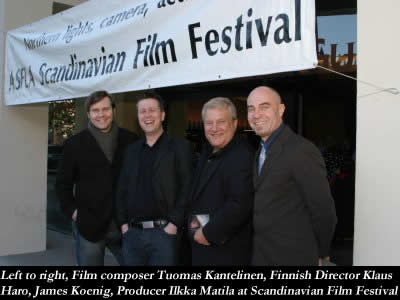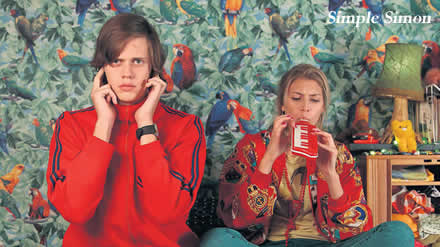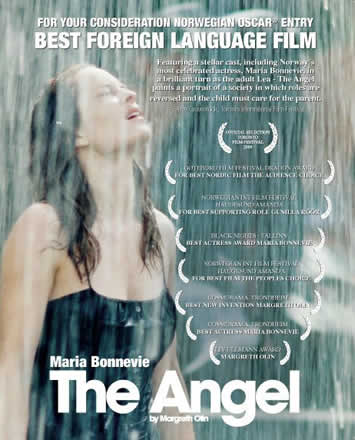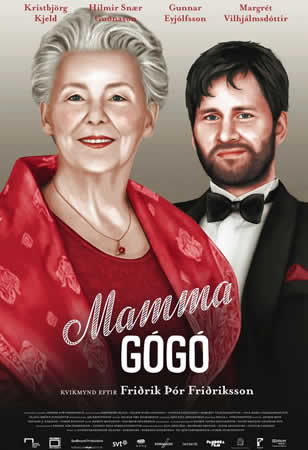 This week we had the opportunity to interview James Koenig, director of Scandinavian Film Festival, LA, about the 2011 festival.
This week we had the opportunity to interview James Koenig, director of Scandinavian Film Festival, LA, about the 2011 festival.
James Koenig is used to both sub and super-titles in his dealings with foreign language film and in his non-film endeavors as a classical singer. In fact, his voice has been heard in various arts arenas—not only as a singer, but also as an arts advocate, writer, director, commentator, and teacher. He has served on juries evaluating both singers, and films. He is the founder/director of the 12 year old SFFLA. Of German and Swiss heritage, it was life experience, travel, and music that introduced him to the Nordic countries. He was decorated by the Finnish government as a Knight of the Order of the Finnish Lion. He teaches singing privately in Los Angeles and at the Bel Canto Institute in Florence, Italy. He says “Life seems to be full of subtitles and subtexts—whether one is singing, writing, or seeing a good film! “
Bijan Tehrani: Can you tell us a little bit about the background of the Scandinavian Film Festival.
Jim Koenig: Perhaps we could say that the history of SFFLA goes all the way back to when I was in high school in Indianapolis and would all the way across town to the so-called “art-house” theater where they played exotic films from far away places in other languages with subtitles. To me that represented a mysterious world beyond what I had experienced. And it had a quality of “forbidden fruit” like the title of one of our films this year. If my parents had known I was going all the over there, I probably would have been grounded. Among those films were some Bergman films. Fast forward to Los Angeles where I had become involved with Scandinavian culture through travel and friends and through my music activities. I became involved with the American Scandinavian Foundation. (I guess for the Norwegians I wasn’t a Swede, and for the Swedes I wasn’t a Norwegian. And the Finns had adopted me and I had been singing already a number of times in Finland.) Anyway, I was invited to a screening sponsored by the Danish and Norwegian Consulates and Women in Film of Liv Ullman’s directorial debut film Sophie. It’s an excellent film. In fact, Liv Ullmann was also there for the screening. It made me think — “There are wonderful films like this in the universe that we never get to see if they don’t happen to get U.S. distribution. And even then—it’s limited.” (The “art houses” like the one I had gone to in high school were few and far between and in many places non-existent. I thought–“we need a Scandinavian Film Festival in Los Angeles! “ And there had never been one. We live in a place that is known as the “film capital” of the world! We need to establish opportunity for cinema culture exchange. We often see people celebrating ethnicity via the folkloric and stereotype images of a people. And that’ fine. But it might just sell short a living history and contemporary cultures. Cinema really represents what is happening right now, and even when it’s historical cinema, it tells the stories that represent what has made people who they are today. And most importantly, cinema leads us through the “embroidery” of our individual stories, to the universals which transcend borders and sensitize us to our common humanity.
where they played exotic films from far away places in other languages with subtitles. To me that represented a mysterious world beyond what I had experienced. And it had a quality of “forbidden fruit” like the title of one of our films this year. If my parents had known I was going all the over there, I probably would have been grounded. Among those films were some Bergman films. Fast forward to Los Angeles where I had become involved with Scandinavian culture through travel and friends and through my music activities. I became involved with the American Scandinavian Foundation. (I guess for the Norwegians I wasn’t a Swede, and for the Swedes I wasn’t a Norwegian. And the Finns had adopted me and I had been singing already a number of times in Finland.) Anyway, I was invited to a screening sponsored by the Danish and Norwegian Consulates and Women in Film of Liv Ullman’s directorial debut film Sophie. It’s an excellent film. In fact, Liv Ullmann was also there for the screening. It made me think — “There are wonderful films like this in the universe that we never get to see if they don’t happen to get U.S. distribution. And even then—it’s limited.” (The “art houses” like the one I had gone to in high school were few and far between and in many places non-existent. I thought–“we need a Scandinavian Film Festival in Los Angeles! “ And there had never been one. We live in a place that is known as the “film capital” of the world! We need to establish opportunity for cinema culture exchange. We often see people celebrating ethnicity via the folkloric and stereotype images of a people. And that’ fine. But it might just sell short a living history and contemporary cultures. Cinema really represents what is happening right now, and even when it’s historical cinema, it tells the stories that represent what has made people who they are today. And most importantly, cinema leads us through the “embroidery” of our individual stories, to the universals which transcend borders and sensitize us to our common humanity.
 That screening of Liv Ullmann’s film, had started my wheels turning and I was convinced that a Scandinavian Film Festival would be a good thing. I then took the idea and began to structure it. I did not want to our festival to be a random film offering tucked away in a remote projection room with 15 people in the audience. I wanted the festival to mean something—to reach out into the film savvy world of Hollywood. We live in a “film world” all the time in Los Angeles. But there is a time when interests peaks, that I like to call “winter film season”, where there are a series of festivals and award shows which culminate in the Oscars. The timing of our festival sort of chose us. Our screenings often give an additional screening for Academy voters for foreign language nominations. We screen as many as possible of the Nordic Oscar submissions. But we always put them in the context of other current feature films from the Scandinavian countries. And sometimes, audiences like this or that “additional” film better than the one chosen to represent and compete in the Oscar race. There’s a wonderful body of work—in fact, Nordic film represents 10% of all of European film making—and we want to offer a great opportunity to focus in on the feast of Scandinavian films that comprise our program. At the first festival we had no idea how many people where going to show up and all of a sudden we had a full theatre at the Writer’s Guild Theatre. It proved to me that people are really eager to delve into a different menu of film. And it wasn’t just ex-pats or people with Danish, Finnish, Icelandic, Norwegian, or Swedish heritage. It was a combination of Scandinavian interest community, film interest community, film lovers, and film professionals. That made us very happy! And suddenly here we are at year number twelve.
That screening of Liv Ullmann’s film, had started my wheels turning and I was convinced that a Scandinavian Film Festival would be a good thing. I then took the idea and began to structure it. I did not want to our festival to be a random film offering tucked away in a remote projection room with 15 people in the audience. I wanted the festival to mean something—to reach out into the film savvy world of Hollywood. We live in a “film world” all the time in Los Angeles. But there is a time when interests peaks, that I like to call “winter film season”, where there are a series of festivals and award shows which culminate in the Oscars. The timing of our festival sort of chose us. Our screenings often give an additional screening for Academy voters for foreign language nominations. We screen as many as possible of the Nordic Oscar submissions. But we always put them in the context of other current feature films from the Scandinavian countries. And sometimes, audiences like this or that “additional” film better than the one chosen to represent and compete in the Oscar race. There’s a wonderful body of work—in fact, Nordic film represents 10% of all of European film making—and we want to offer a great opportunity to focus in on the feast of Scandinavian films that comprise our program. At the first festival we had no idea how many people where going to show up and all of a sudden we had a full theatre at the Writer’s Guild Theatre. It proved to me that people are really eager to delve into a different menu of film. And it wasn’t just ex-pats or people with Danish, Finnish, Icelandic, Norwegian, or Swedish heritage. It was a combination of Scandinavian interest community, film interest community, film lovers, and film professionals. That made us very happy! And suddenly here we are at year number twelve.
BT: What should we expect to see in the 2011 festival?
JK: This year you can expect a lot of variety! –from soup to nuts. (Take that as you will.) I have joked we are the festival that should have Prozac in the lobby instead of popcorn. Scandinavian films have a little reputation of being very dark, but in fact we have had very comic films, romantic films, and films that leave your heartstrings vibrating at the core of your  being. Nordic film makers do not shy away from “tough subjects.” It’s also been very interesting to see the immigrant stories that come out of Scandinavia. And we have seen stories not only “about” immigrants to the Nordic countries, and their immigrant experience, but films “by” immigrant Nordic film makers who have a Scandinavia identity and a “country of origin” identity as well. For instance we will once again offer the work of Lebanese/Swedish filmmaker Josef Fares (Jalla, Jalla and ZoZo) with his new film—”Balls”. As you can imagine, we’ve had fun writing sentences about screening Josef Fares’ Balls. One thing’s for sure, no-one can say that our festival doesn’t have Balls!
being. Nordic film makers do not shy away from “tough subjects.” It’s also been very interesting to see the immigrant stories that come out of Scandinavia. And we have seen stories not only “about” immigrants to the Nordic countries, and their immigrant experience, but films “by” immigrant Nordic film makers who have a Scandinavia identity and a “country of origin” identity as well. For instance we will once again offer the work of Lebanese/Swedish filmmaker Josef Fares (Jalla, Jalla and ZoZo) with his new film—”Balls”. As you can imagine, we’ve had fun writing sentences about screening Josef Fares’ Balls. One thing’s for sure, no-one can say that our festival doesn’t have Balls!
BT: Will there be any guest filmmaker this year?
JK: We look forward to having a number of filmmakers—directors and on-screen talent, including Norwegian Director Margreth Olin. There will be a group from Women in Film attending the screening of her first feature, the Norwegian Oscar submission, The Angel. We’ve often seen film makers with a short or documentary, reappear later with feature film sometimes even vying for an Oscar nomination. Such is the case with Margaret Olin. We previously screened her award-winning documentary call All about My Father, which garnered a lot of attention on the festival circuit. Olin’s father whom she was documenting was a doctor in small town in Norway who just happened to be a cross dresser. Her first feature, “The Angel”, is a very difficult but touching story about a young Norwegian mother who supports her heroin addiction through prostitution. The gambit of human experience is represented in the stories that come into focus in film– and it is not always pretty. Another film that we have this year which tackles a difficult subject is by Icelandic Director Fridrik Thor Fridricksson, who received Critical acclaim for his 1995 road film “Cold Fever”. This year it’s “Mamma GoGo”. The film deals with Alzheimer’s story, which is poignant, but lighthearted as well.
BT: What are the dates of the festival and how can people attend the festival? JK: Our dates are January 8th and 9th 15th and 16th! We are again at the Writer’s Guild Theater in Beverly Hills. People can go to our website www.sffla.net to order tickets online, and also see the current schedule with links to websites for each of the films, and trailers. We have a very important documentary this year. It’s a fascinating Danish, Finnish co-production called Into Eternity. It is supposed to be one of the most important environmental films ever! It’s about facilities being built to store nuclear waste. Scientist say there is no failsafe way to store nuclear waste. The tunnels under construction to store nuclear waste In Finland are supposed to last 100,000 years–the length of time that nuclear waste remains hazardous. We also offer a chance to see Hans Petter Moland’s film A Somewhat Ordinary Man just prior to its American release. And, fans of the Swedish three-film block buster —Millennium Trilogy, will have a chance to catch all three—Girl with the Dragon Tattoo, The Girl who Kicked the Hornet’s Nest, and The Girl Who Played with Fire.
JK: Our dates are January 8th and 9th 15th and 16th! We are again at the Writer’s Guild Theater in Beverly Hills. People can go to our website www.sffla.net to order tickets online, and also see the current schedule with links to websites for each of the films, and trailers. We have a very important documentary this year. It’s a fascinating Danish, Finnish co-production called Into Eternity. It is supposed to be one of the most important environmental films ever! It’s about facilities being built to store nuclear waste. Scientist say there is no failsafe way to store nuclear waste. The tunnels under construction to store nuclear waste In Finland are supposed to last 100,000 years–the length of time that nuclear waste remains hazardous. We also offer a chance to see Hans Petter Moland’s film A Somewhat Ordinary Man just prior to its American release. And, fans of the Swedish three-film block buster —Millennium Trilogy, will have a chance to catch all three—Girl with the Dragon Tattoo, The Girl who Kicked the Hornet’s Nest, and The Girl Who Played with Fire.
BT: What is the sponsorship history of the festival?
JK: The parent organization of SFFLA is the American Scandinavian Foundation of Los Angeles, an organization with an international spirit that affirms that any celebration of ethnicity is a celebration of diversity. ASFLA was founded in 1939 to foster friendship between the United States and the five Scandinavian countries. In the beginning of the festival, the Danish Film Institute and the Nordic Counsel of Ministers via a grant to Scandinavian Film (an umbrella organization of the five Nordic film institutes) were our major sources of “overseas” funding. Now, with the present economy, we’ve had to find more of our support locally. Sadly, those grants went away with budget cuts. Our major sponsors include ELMA, European Languages of Movies in America, the Barbro Osher Pro Suecia Foundation, SWEA (Swedish Women’s Educational Association), The Royal Norwegian Consulate General in San Francisco, and the Finnish Consulate General in Los Angeles. We still depend on help from local honorary consulates, on the film institutes, and, of course, on individual donors. Anyone can become a donor via our web-site.

